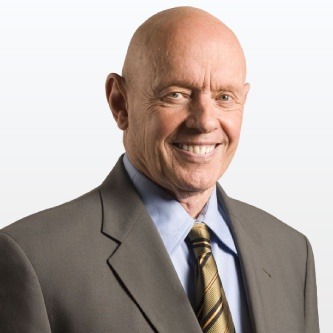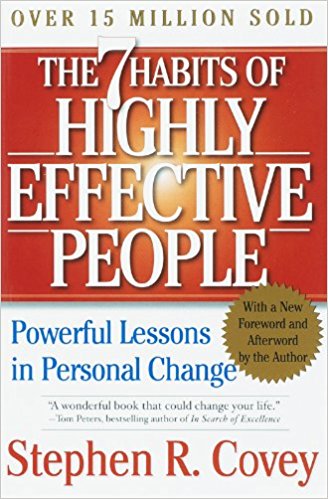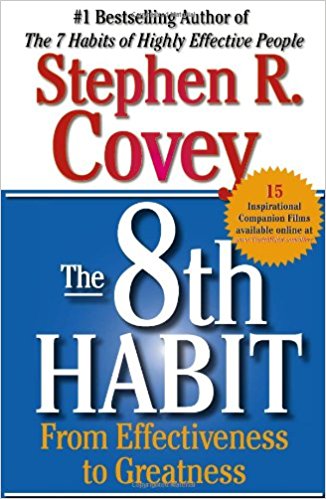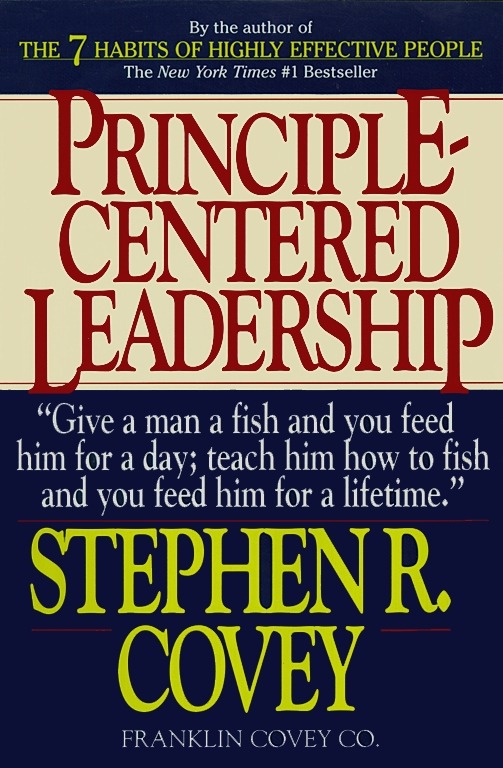Stephen R. Covey – A Journey of 100 Steps
6 min read ⌚
In 1996, to the surprise of some, “Time” magazine included Stephen Covey in its annual list of “25 Most Influential Americans.” Two decades later and few years after Covey’s death, it’s obvious that “Time” didn’t make any mistake: Covey’s books are still widely read and loved, with “Forbes” naming “The 7 Habits of Highly Influential People” one of the 10 best business books in history.
So, without further ado –
Who Is Stephen Covey?
Stephen R. Covey was born on October 24, 1932, in Salt Lake City, Utah.
was born on October 24, 1932, in Salt Lake City, Utah.
Today we know him and love him as “the herald of good habits” (a phrase borrowed from his “New York Times” obituary), but everything could have been a lot different if Stephen Covey hadn’t contracted slipped capital femoral epiphysis (yes, that’s an actual condition!) in junior high school.
You see, Covey was pretty athletic and wasn’t very interested in an academic career up to this point. But, once his physical condition wouldn’t allow him to focus on sports – he had steel pins implanted in his legs and had to spend three years on crutches – he started reading ferociously and even manage to graduate from high school one year early.
And the books he read the most can be classified into three categories. All of them had a profound impact on his worldview, and one can easily trace the genesis of “The 7 Habits” philosophy into his unique educational path.
Namely, Stephen R. Covey earned a B.S. degree in business administration from the University of Utah in 1952, and an MBA from Harvard University five years later. And, like many of us, during these years, he fell in love with Peter Drucker’s works. Back in 1967, the founder of modern management wrote that “effectiveness… is a habit.” Covey will never forget this.
In 1970, Covey got a job as an adjunct professor in the business department at Brigham Young University in Provo. By now already a father of nine children, he would use this occasion to finally complete his doctorate. His subject: “the human side of success in America, as evidenced through ‘success literature’ from 1776 forward.” And that is the second category of books which will profoundly influence Covey. Because during his research, he found out that American self-help books had focused on character building for almost two centuries before the Second World War made them so superficial and insincere.
And Covey didn’t want to be insincere, because he was a devoutly religious person, a life-long member of “The Church of Jesus Christ of Latter-day Saints.” Yes – that’s a fancy way of saying that Covey was a Mormon (he was from Utah, after all!) His religious views influenced him so much that Clayton Christensen, a fellow-Mormon and – yes! – the author of this book, once summed up “The 7 Habits” as “essentially a secular distillation of Mormon teaching.”
Four years before he published his most famous book, Covey founded the Covey Leadership Center which will later merge with Franklin Quest to become Franklin Covey, a consultant firm which generates millions of dollars and has advised about 80% of the Fortune 100 companies so far.
In April 2012, Covey was riding his bike down a hill when he suddenly lost control and hit his head on the pavement. Four months later, on July 16, 2012, he passed away at the age of 79.
Be a light, not a judge. Be a model, not a critic.
Best Stephen Covey Books
#1. The 7 Habits of Highly Effective People Summary: Powerful Lessons in Personal Change
 Since first being published in 1989, “The 7 Habits of Highly Effective People” has reached two milestones which have transformed it from a brilliant self-help book into a historical curiosity. Namely, the book is not only one of the few to sell over 25 million copies of its paperback edition, but it is also the first non-fiction book in history to sell over 1 million copies of its audio version!
Since first being published in 1989, “The 7 Habits of Highly Effective People” has reached two milestones which have transformed it from a brilliant self-help book into a historical curiosity. Namely, the book is not only one of the few to sell over 25 million copies of its paperback edition, but it is also the first non-fiction book in history to sell over 1 million copies of its audio version!
But, what made this book so exceptional?
Two things.
First of all, it’s against-the-grain thought model: Covey says that the oft-promoted “personality ethic” is obsolete and that “character ethic” is the new sheriff in town. In other words, you don’t need to be just independent – but interdependent as well.
And secondly, its straightforwardness. What you read in the title, you get in the book. The first three habits delineate Covey’s vision of independence: be proactive, begin with the end in mind, and put first things first. The second three outline his idea of interdependence: think win-win, seek first to understand than to be understood, and synergize. And the last habit is the bridge between these two groups: sharpen the saw, or improve consistently over time.
People often find themselves achieving victories that are empty, successes that have come at the expense of things they suddenly realize were far more valuable to them.
#2. The 8th Habit Summary: From Effectiveness to Greatness.
 A quarter of a century after “The 7 Habits of Successful People” was published, Stephen Covey felt that he needed to make an update for the “New Knowledge Worker Age.”
A quarter of a century after “The 7 Habits of Successful People” was published, Stephen Covey felt that he needed to make an update for the “New Knowledge Worker Age.”
The seven habits aimed to make people highly effective. And judging by the sheer number of sold copies, they did just that for millions. However, in 2005, Covey felt that being effective wasn’t enough anymore. People needed to make a step forward, a stride towards the top, a move from effectiveness to greatness.
The world had changed, and it didn’t ask for merely useful people anymore; now it asked for great people, passionate people living their lives to the full and making significant contributions.
So, if you managed to become a highly effective person in the period between 1989 and 2005, you needed to add one more habit to your store: “The 8th Habit.” Or, in Stephen Covey’s words, you needed to “find your voice and inspire others to find theirs.”
Find out how with this book.
To touch the soul of another human being is to walk on holy ground.
#3. Principle-Centered Leadership Summary: Give a Man a Fish and You Feed Him for a Day: Teach Him How to Fish and You Feed Him for a Lifetime
 If in “The 8th Habit” Covey updated “The 7 Habits of Highly Effective People”, you could argue that in “Principle-Centered Leadership” he moved beyond them. Make no mistakes: they are still there and as important as ever. However, they are also now coupled with four timeless, universal principles: security, guidance, wisdom, and power.
If in “The 8th Habit” Covey updated “The 7 Habits of Highly Effective People”, you could argue that in “Principle-Centered Leadership” he moved beyond them. Make no mistakes: they are still there and as important as ever. However, they are also now coupled with four timeless, universal principles: security, guidance, wisdom, and power.
Truth be told, ever since his most famous book, Covey adamantly refused to equate principles and values, claiming that while the former are universal, the latter are subjective. In other words, only principles can be considered a trait of interdependence. And, consequently, only they can help us find some meaning in this world.
“Principle-Centered Leadership” demonstrates how we can apply the four most important principles in our homes and organizations and how, implementing them, may help us become not only more effective but also better people.
Effective people lead their lives and manage their relationships around principles; ineffective people attempt to manage their time around priorities and their tasks around goals. Think effectiveness with people; efficiency with things.
Like this summary? We’d Like to invite you to download our free 12 min app, for more amazing summaries and audiobooks.
“Stephen Covey Quotes”
I am not a product of my circumstances. I am a product of my decisions. Share on X Most of us spend too much time on what is urgent and not enough time on what is important. Share on X Effective people are not problem-minded; they’re opportunity-minded. They feed opportunities and starve problems. Share on X We live in a shortcut world. Can you imagine a farmer ‘cramming’ in the fall to bring forth the harvest, as students have done, and still do, to pass examinations? Can you imagine a mile runner ‘pretending’ speed and endurance? Share on X Almost every significant breakthrough in the field of scientific endeavor is first a break with tradition, with old ways of thinking, with old paradigms. Share on XFinal Notes
Even half a decade after his death, if you search Amazon for its most popular authors – a list updated on a daily basis –you’ll certainly find Stephen Covey’s name there, probably among the top 10. Currently, he firmly holds the 8th position, above, say, Dr. Seuss and Stephen King!
Needless to add, he is the top-ranked self-help and non-fiction author in Amazon’s history. Do you need anything more to start reading his three best books?
Emir is the Head of Marketing at 12min. In his spare time, he loves to meditate and play soccer.







